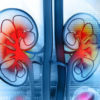Sinus Infection Treatment in New Jersey
 If a cold or flu does not improve within a week, it may have developed into a sinus infection. Sinus infections have persistent symptoms that can last weeks or even months without relief.
If a cold or flu does not improve within a week, it may have developed into a sinus infection. Sinus infections have persistent symptoms that can last weeks or even months without relief.
At Bergen Medical Associates, the team of over 40 board-certified physicians, nurses, and staff represents a broad range of specialties, including internal medicine and allergy and immunology. Our team is qualified to provide sinus infection treatment to help patients throughout northern New Jersey find relief.
What Is a Sinus Infection?
A sinus infection, or sinusitis, occurs when the tissues lining the sinus cavities become irritated. This causes the tissues to become swollen or inflamed, potentially blocking the cavities. They may also overproduce mucus in an attempt to clear away the irritation.
The sinuses are four paired cavities in the head, interconnected by narrow passages. These typically are filled with air to facilitate airflow. They also generate mucus that drains through the nasal passages. This mucus is responsible for flushing away bacteria, viruses, and other disease-causing pathogens.
Most sinus infections are caused by an allergy or a virus such as the common cold. These infections typically last less than 10 days. Sinus infections caused by bacteria or fungus are slightly more severe. In some cases, chronic sinus infections may develop. Chronic infections last for over 3 months and may continue to reappear with occasional flare-ups.
What Are the Symptoms of a Sinus Infection?
Some cases of the common cold or influenza do not improve as they should. In other cases, it may seem like symptoms improve before suddenly returning. This means the cold or influenza has caused a sinus infection. Patients may experience:
- Runny nose with thick yellow-green mucus
- Blocked or stuffy nose
- Postnasal drip, or mucus that drips down the throat
- Pressure around the nose, eyes, and forehead
- Pressure or pain in the teeth
- Ear pressure or pain
- Bad breath or a bad taste in the mouth
- Coughing
- Headache
- Fatigue or tiredness
- Fever
Sinus infections often resemble other common respiratory conditions, including nasal allergies, the common cold, influenza, and COVID-19. Because the symptoms are so similar, it can be difficult to tell the difference without medical testing. Each condition is treated using different medications. An accurate diagnosis is essential to determining the correct treatment.
What Are Sinus Infection Risk Factors?
Anybody can develop a sinus infection, especially after a contagious disease. Some people, however, are more at risk than others. These are people whose sinuses are weak and more susceptible to infection. Common risk factors include:
- Nasal allergies
- Nasal polyps, or growths within the nasal cavity
- A deviated septum, which may cause sinus blockages
- A weakened immune system
- Immunosuppressant medications
- Smoking, which weakens the mucus membranes in the sinuses
Some sinus infections may lead to complications. An existing infection caused by viruses may leave the sinuses weakened and exposed to bacteria or fungi, which can cause a more serious infection. Very rarely, the bacteria or fungus may spread to the brain, eyes, or nearby bone tissue. This development is unlikely but potentially life-threatening.
How Are Sinus Infections Diagnosed?
Allergists and Internists diagnose sinus infections based on a patient’s symptoms and medical history. The doctor will perform a physical examination of the ears, nose, and throat to check for swelling or blockage. They may also use an endoscope to look inside the nose. In some cases, the physical test may be followed by other diagnostic tests such as:
- Nasal swabs
- Computed tomography (CT) imaging
- Allergy testing, especially for chronic sinus infections
- Tissue biopsies
The diagnostic tests help doctors rule out other health conditions while identifying the pathogen responsible for the infection. This information helps them select the most effective medication to treat the condition.
What Are the Treatment Options for Sinus Infection?
Most sinus infections will improve by themselves. While waiting for the infection to heal, an allergist or immunologist may recommend ways to manage symptoms at home:
- Decongestants
- Over-the-counter (OTC) cold and allergy medications
- Nasal saline rinses
- Drinking lots of fluids
- Placing a warm, wet towel across the face
- Breathing in moisture from steam or a humidifier
- Getting plenty of rest
If symptoms do not improve after 10 days, the doctor may prescribe decongestants or intranasal steroid sprays. Antibiotics also may help infections that are bacterial in origin. Severe cases may require surgery, especially when polyps or a deviated septum are impacting the condition.
Treat Sinus Infections at Bergen Medical Associates
If you or a loved one is struggling with a persistent or recurring sinus infection, seek treatment today. Bergen Medical Associates is a comprehensive multi-specialty practice offering sinus infection treatments and other health services at locations across northern New Jersey, including Emerson, Montvale, Northvale, Paramus, and Ridgewood. Contact us to request an appointment.










